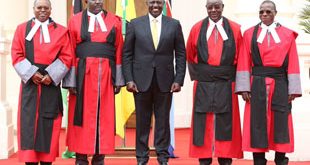President Ruto started work immediately, presiding over the swearing-in of four Court of Appeal judges and two Environment and Land Court judges, State House, Nairobi. PHOTO STATE HOUSE KENYA
The ascendency of William Ruto to the presidency of Kenya has raised speculation, and hope, among the people of the East African Community, for better trade and economic relations within the region. The business community will for long remember the troubles that they have faced dealing with the Kenyan authority over the last five years, the last term of office of President Uhuru Kenyatta.
Every trader, and in this case, a cross-border trader, wants to operate in a predictable environment, with a stable policy regime implemented to the dot. The absence of this has been the main shortcoming traders in the region face since the revival of the community 21 years ago. However, for Uganda, the impromptu bans on exports to the region’s largest and most advanced economy especially in the last five years even threatened change in government policies.
In 2020, the government of Uganda estimated that losses arising from the non-tariff barriers by Kenyan authorities amounted to 480 million dollars or about 1.7 trillion Shillings. These barriers are in the form of delayed border clearance of perishable goods which led to destruction, and an outright ban on sugar, dairy products, poultry products, and beef, among others.
Kenya has always claimed three main reasons for its actions. It accuses Uganda of exporting substandard products, especially milk, maize, and beef, not fit for human consumption. The country has also at other times accused Uganda of importing goods from other regions as far as Brazil, for sugar, and repackaging it as made in Uganda allegedly to avoid paying taxes.
Kenya has sent numerous delegations to Uganda to inspect the Ugandan factories and determine whether the country has enough capacity to produce in surplus or not. There has never been a report by any of the delegations to confirm or dispel their suspicions. The other reason that has been stated is that Uganda imposes high tariffs on Kenyan goods, in violation of the EAC tax regime.
In December 2021, the government of Uganda threatened to ban some Kenyan agricultural products from the Ugandan market in retaliation. At that time, there was a ban on sugar, eggs, and milk, specifically Lato Milk. The threat to ban Kenyan imports came just after Ugandan poultry farmers called on the government to reciprocate the actions of Nairobi.
President Yoweri Museveni has always maintained a soft stance on the Non-Tariff Barries-NTBs between Kenya preferring diplomacy as opposed to retaliation. He at one time said Uganda would never reciprocate but would continue talking with the other countries. This was markedly different from the approach taken by Tanzania, which usually responded with an immediate retaliation, and when Samia Suluhu Hassan became president, one of the first moves by Kenya was to agree to remove tariffs between the two countries.
In spite of the bans, Uganda’s trade with Kenya continued to grow. Uganda Manufacturers Association Executive Director Daniel Birungi said Kenya’s actions were out of fear of Uganda’s rapid growth in export production, adding that it was “being done with a view to discourage dealing in Uganda originating goods, especially poultry, milk, sugar.”


